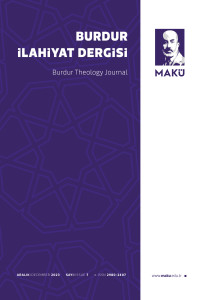Abstract
Stockholm syndrome is defined as the development of an emotional attachment by a captive or prisoner to his or her captor. In this context, the hostage feels an attachment to the hostage taker. This term originated in a bank robbery in the city of Stockholm when one of the hostages was unable to separate from the robber after the robber released him. The hostage was involved in the crime as a voluntary part of the robbery. This theme, which is treated individually in psychology, has a social and historical dimension in the case of the Israelites. What we mean by the conceptualisation of "Social Stockholm Syndrome" is the attempt to explain the social reflexes such as admiration and imitation developed by the lower stratum society against the upper stratum society after the societies, like individuals, have been in a second class position under the hierarchical superiority of another society at any time in history, tortured, enslaved or enslaved.
References
- (Araştırma Notu türünde hazırlanan bir çalışma olduğu için kaynakça eklenmemiştir)
Abstract
Stockholm sendromu, tutsak veya esirin kendisini rehin alan kişiye karşı duygusal bağ geliştirmesi olarak tanımlanmaktadır. Bu minvalde rehine kendisini rehin alana karşı bir bağlılık hissetmektedir. Bu terim Stockholm şehrinde gerçekleşen bir banka soygununda rehinelerden birinin soyguncunun kendisini serbest bırakmasından sonra ondan ayrılamaması sonucu ortaya çıkmıştır. Rehine esir alındığı soygunun gönüllü bir parçası olarak suça dahil olmuştur. Psikolojide bireysel olarak işlenen bu tema, İsrailoğulları örneğinde sosyal ve tarihsel bir boyut taşımaktadır. “Sosyal Stockholm Sendromu” kavramsallaştırması ile kastettiğimiz husus ise, bireyler gibi toplumların da tarihin herhangi bir zamanında bir başka toplumun hiyerarşik üstünlüğü altında ikinci sınıf konumunda bulunması, işkence görmesi, köle statüsünde çalıştırılması veya esir edilmesi gibi durumların atlatılmasının ardından alt tabakadaki toplumun üst tabakadaki topluma karşı geliştirmiş olduğu hayranlık ve taklit gibi toplumsal reflekslerin açıklanmaya çalışılmasıdır.
References
- (Araştırma Notu türünde hazırlanan bir çalışma olduğu için kaynakça eklenmemiştir)
Details
| Primary Language | English |
|---|---|
| Subjects | Sociology of Religion, Sociology (Other), Jewish Studies |
| Journal Section | Research Note |
| Authors | |
| Publication Date | December 28, 2023 |
| Submission Date | October 27, 2023 |
| Acceptance Date | December 23, 2023 |
| Published in Issue | Year 2023 Issue: 7 |
Burdur Theology Journal is licensed under a Creative Commons Attribution-NonCommercial 4.0 International License (CC BY NC).

